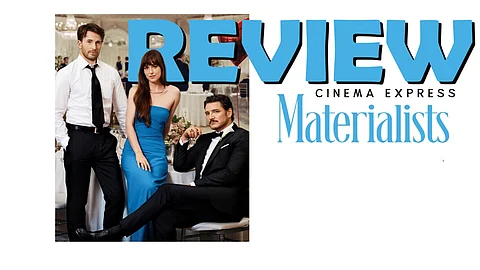Materialists Movie Review: A Heartwarming Exploration of Love
Materialists Movie Review(4 / 5)
The human mind is rarely level-headed when it comes to love. It wants acceptance, yearns for visibility, and most of all, wants to feel valued. But finding love in the right person turns humans more tempestuous with their feelings. It is interesting how time makes some people feel conflicted about finding love with their partners because they are unable to see past their flaws. They look for various avenues to discover themselves or become more tolerant. But what happens to them during this process, and how does the people they meet in the interim change them? In Celine Song’s Materialists, Lucy (Dakota Johnson) is a career-driven matchmaker who, though steadfastly single herself, proves to be great at her job. When she meets Harry (Pedro Pascal), a “unicorn” who is perfect in every way, she feels like she has encountered her perfect match. At the same time, she also meets her ex-boyfriend, John (Chris Evans), whom she has yet to move on from. The dilemma that Lucy faces in having to choose between the two men leads Lucy on a journey to discover the value of love and partnership.
Director: Celine Song
Cast: Dakota Johnson, Chris Evans, Zoe Winters, Marlin Ireland, Eddie Cahill, and Pedro Pascal
In Materialists, the catalyst that smoothly moves the film ahead is its well-written dialogues, which are wonderfully layered without venturing into the zone of exposition. Lucy is a person who knows love and has experienced heartbreak. So as a matchmaker, she turns into someone who looks for partners who can simply check boxes. Hence, every time she preaches love to a client, it becomes a sermon for herself. The whimper of sadness, the sigh of exasperation, and the squeals of happiness are executed by the actors with such finesse that it elevates the dialogue like music does to a scene.
Building upon the dialogue that creates a realistic environment, Song with composer Daniel Pemberton and cinematographer Shabier Kirchner creates a cohesive New York that sways to the mood of its characters. When we meet Lucy, she is rigid with her choices and focused on her characteristics. Now Kirchner and Song put her in a part of the city that has industrial-style buildings. But on her path to discovering love’s value, she finds happiness at a place where civilisation meets nature. With this, Kirchner and Song create a parallel to her character, shifting the scales to balance what she wants and what she feels. Pemberton, on the other hand, uses perfect, classy, but unforgettable music for Harry — tunes with jazz-like percussion for the imperfect but soulful John, and most of all, acts as a wordless commentary for the film.
While a love triangle is a situation where one person dates two different people at the same time, Materialists is far from that trope. It portrays an adult’s quest for love in a rather honest manner. It also represents the unseen tribulations with integrity. For example, through a montage sequence, we see people turning like a child in a toy store as they list out their expectations for potential partners. Height, weight, net worth, lifestyle habits, political alignment, and race become factors for those clients to choose their partner. Materialists properly represent the sour language used by men to describe the women they desire and the unrealistic expectations of women to describe the men they dream of. These choices usher the film into a space of its own in the romance genre.
Materialists cannot be termed a romcom. While there are sparks of romance with enough levity, it is a proper exploration of humans in unpleasant situations. It is happy, sad, humorous, and heartwarming, but most of all, it makes the viewer curious enough to wonder, “How many will break up with their partners after watching this film?”

